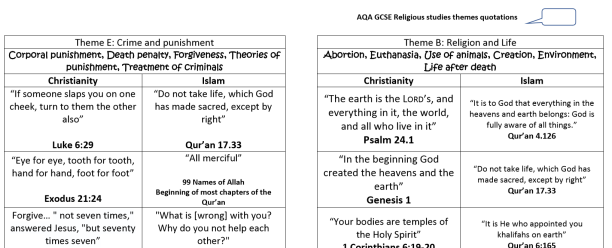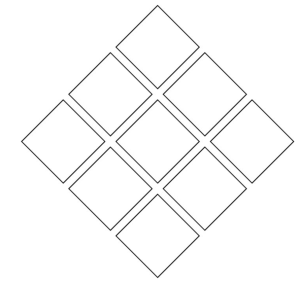Progress has become a feared term for some teachers. It’s a term used to check they’re doing their job, that they are pushing students to their limits or sadly, if they’re not doing their job. Yet, regardless of people’s views on how this has been done badly, I do have a responsibility to ensure my students are making progress over time, otherwise what’s the point of my teaching?
Sadly, teachers are compelled to make sure their spreadsheet shows acceptable increments in student data. The box must ‘go green’. The arrows must ‘go up’. It makes a mockery of data tracking as teachers are pressurised to massage some data or even make it look good to placate a leader that is checking. It’s a waste of everybody’s time. Hours and hours of it. It tells us nothing about the student and with some subjects in their first year of GCSE, is all a game of crystal ball reading.
I’ve been avoiding using marks/grades/levels with students for a few years now. Luckily my school mainly reports on ‘progress’ rather than using grades or levels. So, if asked to ‘prove progress’ and I don’t have a spreadsheet of marks, how can it be done?
Here’s how it can be done professionally and with the added benefit of teacher reflection…
I’ve chosen to look at one particular aspect of the GCSE at key stage 4: evaluation questions. I’ve chosen it because it has the biggest range of ‘skills’ needed in the GCSE: structure, using quotations effectively, selection of relevant knowledge, literacy, analysis and of course, evaluation.
I’ve taken an attempt at this question from last year as a basis. You could start from the first time you get a student to attempt the skill. It needs to be something that can be repeated over a long period of time and has the same conditions for when it is produced.
I then looked at their work on this question over time. Each time they complete a question can compare their work and see what the gaps are in what they’ve done.
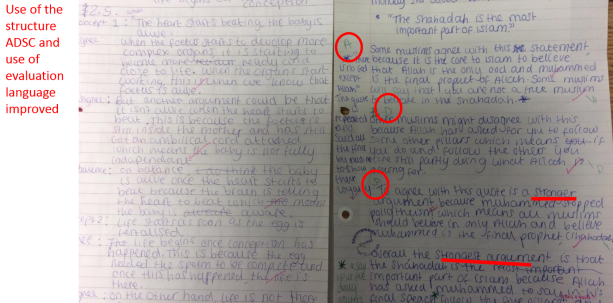
I can clearly see what they’ve done that has improved over time.
Students answers must keep improving….shouldn’t they?
This then informs me of what I might do to move them on again. In this particular case lots of students had moved to adding some of the analysis but I wanted to be sure they could do this consistently. During this time I read this:
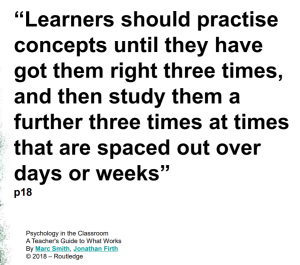
This is interesting because it doesn’t fit with the narrative of constantly getting students to ‘get better’ by doing more. It’s about getting good by being consistent. This is a concept many leaders, need to take on board. We should probably be suspicious if data keeps going up and up!
So, all I needed to then do is ensure they could repeatedly do the same quality of analysis. My next support was not to ‘improve’ their work but was to try to get consistency. I created these:
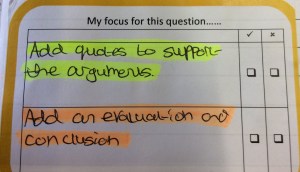
They will now use these every time they complete a question for at least the next three times. I want them to repeatedly show me they can do these with different content in the same conditions.
They then showed this in their work before they hand it in:
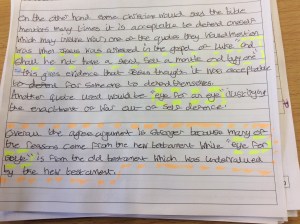
Things don’t always go right but…
In my opinion, it isn’t always about the improvements from the children but about what I am doing to try to support the improvement. For example, I tried a strategy that I don’t think worked. It doesn’t matter. As I am being a reflective practitioner and this means that I am trying things out. What would a leader prefer, a teacher that doesn’t adjust and tweak things and students don’t improve, or a teacher that is reflective and tries things when some work and some don’t? Teachers should be supported in development not final outcomes.
It’s just another waste of teacher time, providing portfolios of evidence…
The students’ work is in their folders. If I have a conversation with someone about it, I lift up their folder and can show them. I can explain what I did in between attempts and how successful I think it was. Keeping their answers of these questions together really helps.
For ease, I’m taking pictures of work rather than copying it. It really is only a few seconds when I mark their work. I’m not creating a huge portfolio. It has actually really helped my diagnosis of what’s working and not working by looking at them. In some cases I hadn’t realised quite how their style of writing had improved; something a spreadsheet doesn’t record. It has been a good tool to help me understand what is happning with their answers.
Won’t teachers just play the game with the work instead of the data?
This is where controlled conditions are important. We have to trust that teachers will do this. We have to value this process of teacher development. It has to become a discussion about progress not just a presentation of evidence. Most teachers wouldn’t be able to make-up processes of development and student work when discussed, certainly not as easily as putting a an ‘arrow up’ on a spreadsheet.
I’m not suggesting progress can only be evidence through work. We know it can be a poor proxy for progress. It’s all about what the teacher has been doing to support students. This may not have paper evidence. Whole class feedback and discussion should not attempt to be evidence; conversations about planning and teaching matter.
Conversations instead of spreadsheets
If we replace observations with drop-ins to see how the teachers latest idea is going, if we replace data drops with a discussion of student work (not just paper), if we swap performance management numerical targets with a teacher’s reflections throughout the year maybe our understanding of student progress will be far more enlightening that through a spreadsheet.
Why won’t things change?
- Some leaders prefer to spend their time analysing data on a spreadsheet
- Some focus on outcomes rather than the process.
- Some think that everything teachers do should have a positive impact (when it isn’t the case)
- Some see failure of a strategy as failure as a teacher leading to lack of confidence
- Some think they don’t have enough time
- Some believe that progress means that there is always an observable difference in outcomes
- Some believe progress happens in one lesson
- Some over-complicate things with huge portfolios of paper evidence; there’s only one portfolio of paper evidence, the student’s work.
So, are you students making progress? Let me know what you’ve been up to…..
Student work used with their permission










